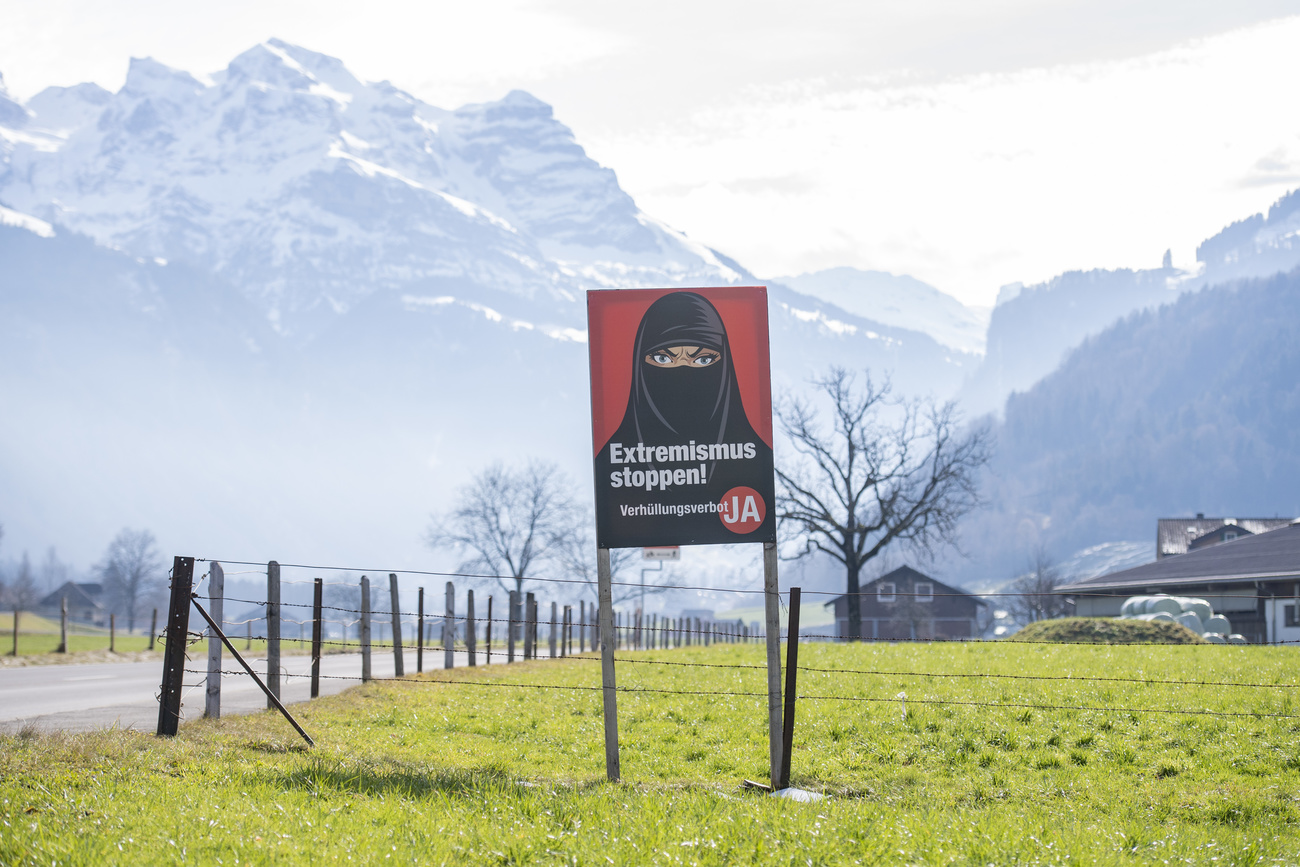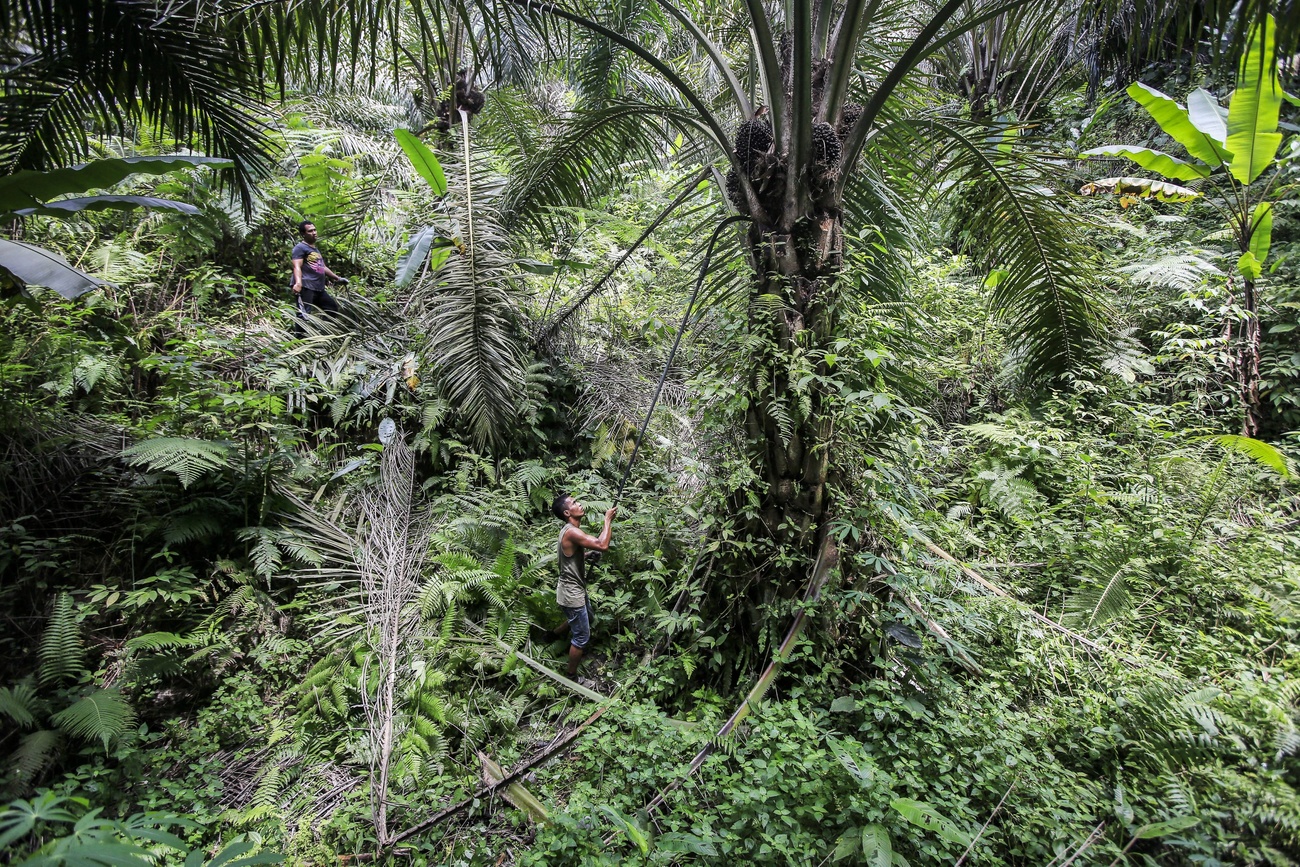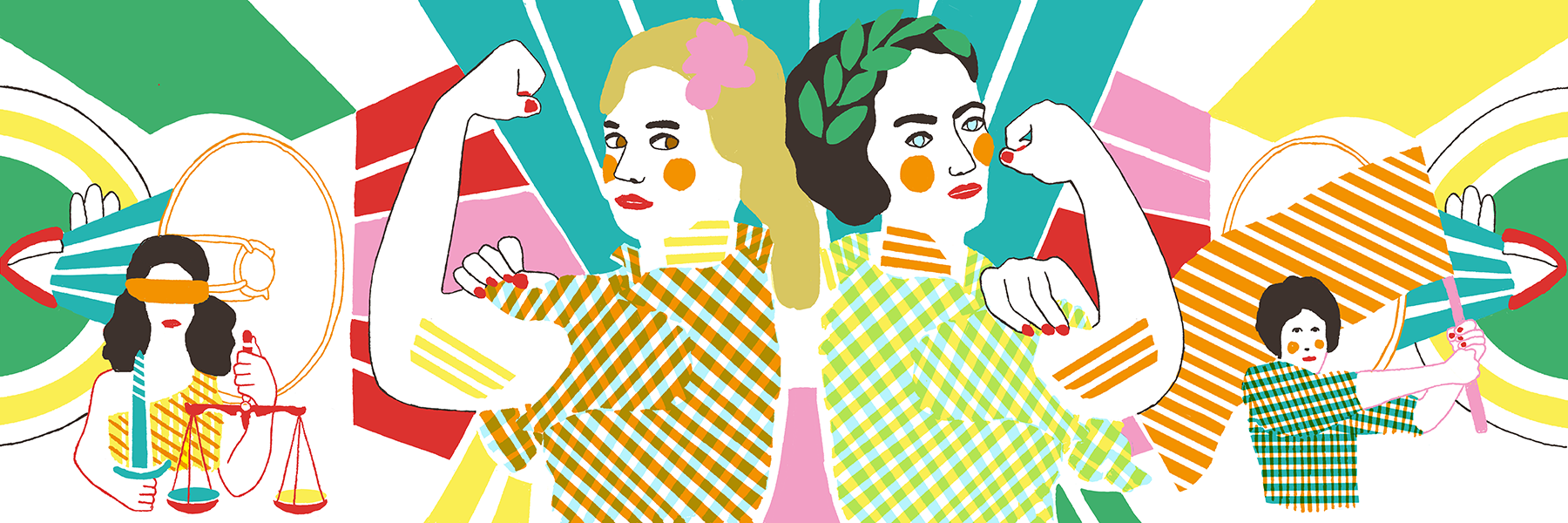What’s on the agenda for Swiss voters on March 7

Burkas, electronic identities, and Indonesian palm oil will be on the menu for the first of four nationwide voting rounds this year. Our latest democracy newsletter offers an overview.
Cover-up – the “burka ban”
The most contentious topic on the ballot is the proposal to ban the wearing of face coverings – notably the burka – in public spaces. Championed by the same right-leaning initiative committee that was behind a “minaret ban” in 2009, (they collected 100,000 signatures within 18 months to bring a vote), the issue raises the tricky question of Switzerland’s relationship with its Muslims, who account for 5.5% of the population.
This time round however, the issue is complicated by a splintered cross-section of backers and opponents: traditional right-wing Islam-sceptics have been joined by feminists who see the burka as a symbol of masculine dominance over female bodies. The fact that some other feminists from the left argue the exact opposite – that women themselves should be free to choose how they dress, even if that means a burka – makes things even more difficult.
What does seem clear is that the vote itself has taken on a dimension far beyond its concrete applicability – between 20 and 30 women in Switzerland are estimated to regularly wear a burka. Backers of the plan say they are pre-empting a future spread of such trends; opponents say it’s a smokescreen for right-wing identity politics. Polls so far reckon the ban will be accepted, in which case Switzerland would join 15 other European countries in outlawing the clothing.
- An overview of what’s at stake, who is for and against, and why Swiss citizens are being asked to vote on it in the first place.
- Jean-Luc Addor of the Swiss People’s Party explains why he is in favour of the idea; Greta Gysin of the Greens outlines why she is against it.
- From the archives: how SWI swissinfo reported on the acceptance of the minaret ban over a decade ago.

Safe surfing – the eID vote
A second vote on March 7 is on the so-called eID law. This government plan, approved by parliament in 2019, proposes that each Swiss citizen, if they so wish, would be able to apply to a provider for an “electronic identity”; this eID would then allow them to securely prove their identity on the Internet and thus go about things like online shopping, opening a bank account, or filing tax returns online.
As opposed to the burka issue, the eID is not earth-shatteringly emotive. But opponents, mainly from the left, have nevertheless challenged it to a referendum (by gathering more than 50,000 signatures within 100 days) on the grounds that the plan foresees that the identities will be provided by private firms rather than directly by Swiss authorities. The opponents, who are not against the idea as such, say this is an abdication of sovereign responsibility, and that private firms should not be handling such sensitive data.
The government, for its part, argues that the providers will be limited to Swiss companies (and regional and local authorities), and that a “no” vote would set Switzerland back a few years in comparison to more digitally advanced nations. Opinion polls so far suggest the eID plans will be accepted.
- An overview of the background, stakes, and arguments.
- One opinion in favour of the proposal, and one opinion against it.
- From the archives: e-voting, although not directly related to this idea of eID, always lurks on the agenda whenever the question of digitalisation comes up.

Palm oil – frictionless trade?
The third issue on the agenda on March 7 is a free trade agreement between Switzerland and Indonesia. This deal, formally signed last year, will cut export duties for a range of Swiss products to the Asian country, including pharmaceutical products and machinery. The cuts are estimated to lead to annual savings of around CHF25 million for Swiss businesses.
But opponents of the deal, including Green politicians and agricultural groups behind the popular referendum, are more worried about the cutting of import duties on goods coming into Switzerland: particularly palm oil, a contentious product which environmental groups say is responsible for rainforest destruction. Fearing that the deal would accelerate such damage in Indonesia, these opponents forced a referendum.
Backers of the deal say it is a pioneering agreement which in fact forces the Indonesian palm oil industry to comply with strict regulations as a condition for receiving the import duty discounts. So far, polls suggest that voters are slightly in favour of the deal.
- Background, stakes, and arguments for and against the vote.
- Simone de Montmollin is in favour of the deal; wine-grower Willy Cretegny is behind the referendum challenge.
- From the archives: a look at the well-meaning but contentious “sustainable palm oil” (RSPO) label.

Locked out: 50 years after women, who’s next?
To celebrate the 50th anniversary of women’s suffrage in Switzerland, we’ve been publishing a series of articles on women and politics over the past few weeks, which you can find in our new focus. One of the elements of this story which attracted most interest was the question raised by SWI swissinfo.ch journalist Renat Küenzi: which groups are still locked out of the democratic decision-making process in 2021?
Readers brought to the debate a range of excluded groups, which they did or didn’t think should be given more rights: people under the age of 18, non-Swiss citizens living in the country, Swiss people living abroad [note: they can vote, it’s just sometimes technically difficult], criminals, the disabled, the retired; there was even an exchange about whether rule-breaking cyclists should be allowed to vote…
This isn’t just a theoretical tiff: various groups are fighting for voting rights as we speak in Switzerland. In the past weeks alone there has been a parliamentary initiative raised to bring the legal voting age down to 16, as well as a resolution adopted by the Social Democrat party to introduce “voting rights for all” – including foreign residents. The socialist proposal also mentions the mentally disabled, who were extended voting rights in Geneva last November.
- Join the debate here: Voting rights – which groups are still locked out?
- News story on the recent decision of Geneva voters (with a majority of 75%) to extend voting rights to the mentally disabled.
- Switzerland’s exclusive democracy: which groups have lacked access to the political process over time?
Is there anything else you’d like to see our democracy team reporting on? Get in touch with correspondents Domhnall O’Sullivan or Bruno Kaufmann

In compliance with the JTI standards
More: SWI swissinfo.ch certified by the Journalism Trust Initiative

You can find an overview of ongoing debates with our journalists here. Please join us!
If you want to start a conversation about a topic raised in this article or want to report factual errors, email us at english@swissinfo.ch.